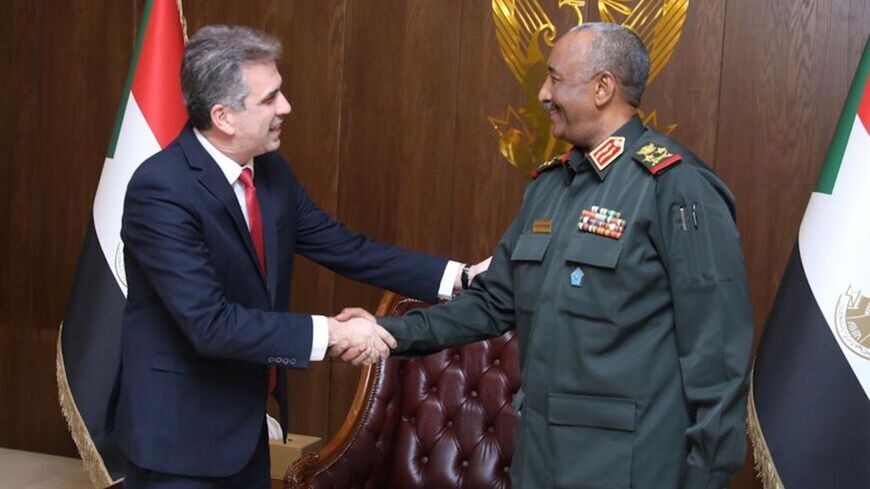Israeli diplomats told Al-Monitor Monday that the current conflict between Sudan’s military and the paramilitary group Rapid Support Forces (RSF) led by Mohamed Hamdan Dagalo (Hemedti) will delay the finalization of the normalization between Israel and Sudan, in process since 2020.
Sudanese leaders have said in recent months that normalization will be concluded only after the establishment of a civilian transition government.
Since 1958 and until two years ago, Sudan considered Israel an enemy country, hosting al-Qaeda leaders under Omar al-Bashir, who was overthrown in 2019, and enabling Iran to transfer weapons to Gaza through its territories. When Sudan severed its ties with Iran in 2016, the thaw with Israel began.
Israel’s rapprochement with Sudan intensified a few months before the signing of the Abraham Accords, with Prime Minister Benjamin Netanyahu meeting Sudan's army chief Abdel Fattah al-Burhan in Uganda in February 2020. Netanyahu said at the time that he was working with Burhan to establish diplomatic relations. In January 2021, Sudan signed a declaration paving the way toward normalization, and in April that year, it approved a bill abolishing a 1958 boycott of the country.
Burhan and Hemedti have both been involved in efforts to normalize ties with Israel and senior Israeli security and intelligence officers have been in contact with both. On multiple occasions, however, Sudanese politicians including Prime Minister Abdullah Hamdoc have expressed objections to establishing ties with Israel based on their commitment to the Palestinian cause.
Director General of the Israeli Foreign Ministry Ronen Levi, also known as Maoz, has been a key figure in establishing contacts with Sudanese counterparts in his former capacity as national security council official. So has Foreign Minister Eli Cohen, who served as intelligence minister in a former Netanyahu government. Cohen led a first official delegation to Khartoum in January 2021.
Levi and Cohen now lead Israeli diplomacy.
In February, Cohen visited Khartoum for what his office called a historic visit. After meeting with Burhan, Cohen said that the two countries had agreed to work toward a peace agreement, stating, "I am happy to announce that during the visit, we have agreed to sign a peace agreement between Sudan and Israel" after a civilian government is installed in Khartoum.
On Sunday, Israel Hayom reported that Israel was involved in efforts to calm the current conflict in Sudan, though there was no official confirmation. It was not the first media report to point to Israeli interference in Sudanese politics. In November 2021, Axios claimed the Biden administration had asked Israel to press Burhan to restore the civilian government toppled in a recent coup. During the past three years, several reports have signaled that senior Israeli officials covertly visited Sudan.
Sudan’s geopolitical status, its relations with Israel's allies Egypt and Ethiopia and its past relations with Iran make it a strategic priority for the country. The Khartoum leadership also considers Israel a door-opener in Washington. And while future relations could include cooperation on smart agriculture, communications and trade, the top rapprochement interest of both countries is clearly security. Be that as it may, according to Israeli diplomatic sources, the final normalization steps have been put on hold, at least until the current conflict dies down. Full normalization might still be far off.
In an unusual move reflecting Israel's interest in developments in Sudan, the Foreign Ministry said in a statement, "We are following with concern the events in Sudan. Israel wants stability and security for Sudan. Israel calls on all parties to refrain from violence and to return to the path of internal reconciliation in order to conclude the process of government transition with a large consensus."







